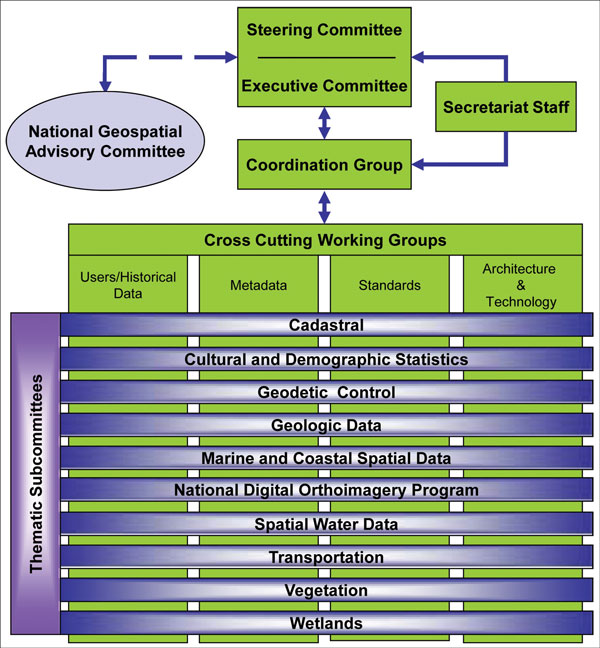The Federal Geographic Data Committee (FGDC) operates under
Office of Management and Budget (OMB) Circular A–16 (revised August
2002). The circular incorporates Executive Order 12906 and reaffirms
the FGDC’s role to provide leadership for the National Spatial Data
Infrastructure (NSDI) and to coordinate the development, use, sharing,
and dissemination of the Nation’s geospatial data. The effective use of
geospatial information requires close coordination among the many
agencies involved in its development.
The FGDC is an organized structure of Federal geospatial professionals
and constituents that provide executive, managerial, and advisory
direction and oversight for geospatial decisions and initiatives across
the Federal Government. In accordance with OMB Circular A–16, the FGDC
is chaired by the Secretary of the Interior or his/her designee, and
the OMB Deputy Director for Management or his/her designee serves as
Vice Chair.
FGDC Structure
The FGDC is governed by a Steering Committee that sets the
FGDC’s high-level strategic direction. The Executive Committee, which
is a subset of the Steering Committee, provides advice and guidance to
the Chair and the Vice Chair.
The National Geospatial Advisory Committee (NGAC) is a Federal advisory
committee that provides advice and recommendations on Federal and
national geospatial programs. The FGDC Coordination Group conducts the
FGDC’s day-to-day business. The FGDC Office of the Secretariat, which
is located at the U.S. Geological Survey headquarters in Reston,
Virginia, provides strategic support and management for FGDC
committees, components, and initiatives.
The FGDC infrastructure also includes committees, agency-led working
groups and subcommittees, and collaborating partners that represent
State, Tribal, and local governments, as well as industry and academic
and professional organizations. All participants initiate and (or)
support the following activities that are crucial to expanding the NSDI
and addressing national priorities:
- Providing advice and leadership in applying geospatial capabilities to address national priorities and Presidential initiatives.
- Developing and establishing the National Geospatial Data Clearinghouse on the Internet.
- Developing and implementing standards.
- Creating a national digital geospatial data framework.
- Promoting collaborative relationships for sharing geospatial data among non-Federal partners.
- Developing policies and processes to better harmonize collective action.

Chart showing the structure of the Federal Geographic Data Committee.
Steering Committee
The FGDC is governed by the Steering Committee, which is the
policy-level interagency group whose central focus is to provide
executive leadership for the coordination of Federal geospatial
activities between, among, and within agencies. The Committee does this
by establishing policy and providing guidance and direction to the
member agencies, based on business best practices. The Steering
Committee is responsible for overseeing activities related to OMB
Circular A–16 and for the implementation of the National Spatial Data
Infrastructure. The FGDC Chair and Vice Chair lead the Committee, which
is made up of senior agency officials for geospatial information
(SAOGIs) and includes representatives from Federal organizations,
including the Executive Office of the President, Federal Executive
Departments, and independent Federal agencies.
A subset of the Steering Committee, the Executive Committee, provides
advice and guidance to the FGDC Chair and the Vice Chair on major
Federal geospatial priorities and initiatives. The FGDC Chair and Vice
Chair lead this committee, which includes representatives from the OMB
and the seven Federal agencies that have the largest investments in
geospatial technologies. The Executive Committee makes recommendations
to the Steering Committee and provides a focal point for coordination
with the National Geospatial Advisory Committee.
| 2012 Steering Committee Agencies | ||
|---|---|---|
|
Federal Communications Commission (non-voting member) |
||
|
General Services Administration |
||
|
Library of Congress |
||
|
National Aeronautics and Space Administration |
||
|
National Archives and Records Administration |
||
|
National Capital Planning Commission (non-voting member) |
||
|
National Science Foundation |
||
|
Office of Management and Budget (tie-breaking vote only) |
||
|
Office of Personnel Management |
||
|
Small Business Administration |
||
|
Smithsonian Institution |
||
|
Social Security Administration |
||
|
Tennessee Valley Authority |
||
|
U.S. Agency for International Development |
||
|
U.S. Army Corp of Engineers (non-voting member) |
||
|
U.S. Department of Agriculture |
||
|
U.S. Department of Commerce |
||
|
U.S. Department of Defense |
||
|
U.S. Department of Education |
||
|
U.S. Department of Energy |
||
|
U.S. Department of Health and Human Services |
||
|
U.S. Department of Homeland Security |
||
|
U.S. Department of Housing and Urban Development |
||
|
U.S. Department of the Interior |
||
|
U.S. Department of Justice |
||
|
U.S. Department of Labor |
||
|
U.S. Department of State |
||
|
U.S. Department of Transportation |
||
|
U.S. Department of the Treasury |
||
|
U.S. Department of Veterans Affairs |
||
|
U.S. Environmental Protection Agency |
||
|
U.S. Nuclear Regulatory Commission |
||
Appendix B

